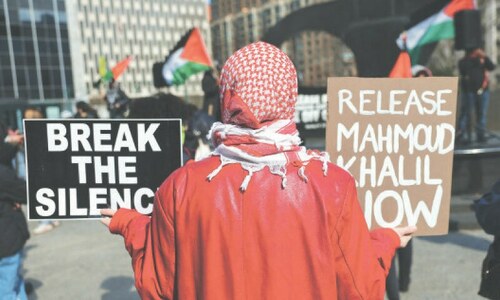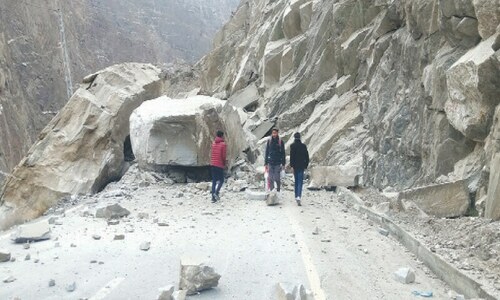BEIRUT: An alleged chemical attack that left dozens dead in Syria’s rebel-held town of Douma sparked international outrage on Sunday, with US President Donald Trump warning there would be a “big price to pay”.
As condemnation poured in, there were reports that just hours after the alleged attack rebel forces had agreed to evacuate Douma, their last holdout in the onetime opposition stronghold of Eastern Ghouta.
Trump’s threat came exactly a year and a day after the US fired cruise missiles at a Syrian airbase in retaliation for a deadly sarin gas attack in 2017.
At least 40 killed in attack on rebel-held Douma
“Many dead, including women and children, in mindless CHEMICAL attack in Syria,” Trump wrote on Twitter on Sunday, lashing out at Syrian President Bashar al-Assad and Russia’s Vladimir Putin, a key ally of the regime.
“President Putin, Russia and Iran are responsible for backing Animal Assad. Big price to pay,” he said.
Asked whether the US could again respond with a missile strike, White House homeland security adviser Tom Bossert told ABC television: “I wouldn’t take anything off the table.”
Military action
France has repeatedly said that evidence of chemical weapons use in Syria could prompt military action and said on Sunday it would “do its duty” following the latest allegations.
The Syrian regime, which denies all accusations of chemical weapons use, denounced the accusations as an “unconvincing broken record”.
The Russian foreign ministry called the latest reports a provocation and warned against them being used as a pretext for military action.
“A military intervention under far-fetched and fabricated pretexts in Syria, where there are Russian soldiers at the request of the legitimate Syrian government, is absolutely unacceptable and could have the most dire consequences,” it said in a statement.
Syria’s White Helmets, who act as first responders in rebel-held areas of Syria, said the attack took place late on Saturday using “poisonous chlorine gas”.
In a joint statement with the Syrian American Medical Society (SAMS), the White Helmets said more than 500 cases were brought to medical centres “with symptoms indicative of exposure to a chemical agent”.
It said six people died while being treated, and rescuers found 42 more people dead in their homes with signs of similar symptoms.
Footage posted online by the White Helmets, which was not possible to verify, showed victims with yellowed skin crumpled on the ground and foaming at the mouth.
Other residents could be seen receiving treatment at hospitals, with shell-shocked medics holding up gas masks to motionless infants.
“The scene was horrifying. So many people were choking, so many people,” White Helmets member Firas al-Doumi said from inside Douma.
“Most died immediately. The majority were women and children,” he said.
“We only have four oxygen machines,” said Mohammed, a doctor inside Douma who said they were not enough to treat the dozens coming in with breathing problems.
“The situation is really, really tragic. I’ve been working here for four years and have never seen what I saw in the last few hours,” he said.
The reports prompted widespread condemnation and calls for an investigation.
UN chief Antonio Guterres said he was “particularly alarmed”, adding that any confirmed use of chemical weapons would be “abhorrent”.
Pope Francis described the allegations as “terrible news”, saying: “Nothing, nothing can justify the use of such devices of extermination against defenceless people and populations.”
London called for an investigation into what it said were the “deeply disturbing” reports and Ankara, which has backed rebels against Assad, said it had a “strong suspicion” he was to blame.
‘Conspiracy’
Regime ally Iran backed Damascus however, saying the allegations were a Western conspiracy and echoing Russia’s warning against foreign military action.
Douma is the last remaining opposition-held town in Ghouta, once the rebels’ main bastion outside Damascus but now ravaged by a seven-week regime assault.
Since Feb 18, Syrian and Russian forces have waged a fierce military onslaught and negotiated two withdrawals to retake control of 95 per cent of Ghouta.
The agreements, brokered by Moscow last month, saw more than 46,000 rebels and civilians bussed to the northwest opposition-held Idlib province.
It appeared Douma would follow suit, with a preliminary deal that saw hundreds of civilians and rebels from Jaish al-Islam quit the town last week.
The rebels had been hoping to land a deal that would keep them in control of Douma, but Syria’s government has insisted on their departure.
After days of talks that brought a brief respite from the assault, the negotiations fell apart and ferocious bombing resumed.
The Syrian Observatory for Human Rights, a Britain-based monitor, said nearly 100 people were killed in air raids on Friday and Saturday.
On Sunday, state media announced Damascus had reached a deal that would see rebels leave Douma within 48 hours.
In exchange Jaish al-Islam would release hostages it had been holding, the source said.
State news agency SANA reported dozens of buses were already entering Douma to begin the evacuations.
There was no immediate confirmation of the deal from rebel sources.
Published in Dawn, April 9th, 2018
















































